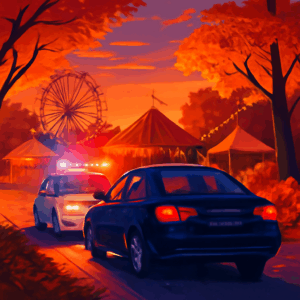Stay Calm and Follow Instructions
During a DUI stop, the most important thing to do is stay calm. As soon as you are pulled over, pull your vehicle over to the side of the road safely, turn off the engine, and keep your hands on the steering wheel. It’s natural to feel nervous, especially if you’ve been drinking, but reacting aggressively or erratically can worsen the situation. When the officer approaches your car, be respectful and polite. Avoid any sudden movements and inform the officer if you have had any alcoholic beverages. While you do not have to disclose how much you have drunk, cooperating respectfully can help your case.
Understanding DUI Checkpoint Laws in South Carolina
DUI checkpoints are legal in South Carolina, and they are used by law enforcement to catch drivers under the influence. These checkpoints can happen at any time, including after local festivals or events where people are more likely to have consumed alcohol. While these stops are legal, they must adhere to strict guidelines to remain constitutional. Officers must set up checkpoints at visible locations with appropriate signage, and they cannot stop cars randomly without a legitimate reason. If a checkpoint is not clearly marked, or if the officers do not follow the proper procedure, you may be able to challenge the stop in court. It is essential to know that these checkpoints are designed to protect public safety, but the police must follow the law when conducting them.Know Your Rights During a DUI Stop
Knowing your rights during a DUI stop is crucial. While you are required to pull over when signaled by law enforcement, you are not obligated to answer all of the officer’s questions. For example, the officer may ask if you’ve been drinking, but you are not legally required to respond. You can politely refuse to answer these questions if you feel uncomfortable. However, South Carolina has an “implied consent” law, which means that by operating a vehicle on state roads, you automatically agree to submit to a chemical test if requested by law enforcement. Refusing to take a breathalyzer or blood test can lead to immediate penalties, such as a driver’s license suspension. Even though you have the right to refuse, it is essential to understand that refusing the test may harm your case in court and result in further complications.Field Sobriety Tests and What They Mean
In many cases, after a DUI checkpoint stop, the officer may ask you to perform field sobriety tests. These tests are meant to determine whether you are under the influence of alcohol or drugs. They often include tasks such as walking a straight line, standing on one leg, or following a pen or flashlight with your eyes. While these tests are voluntary, it’s important to remember that refusing them can lead to arrest, and refusal may be interpreted negatively in a court of law. It’s important to note that field sobriety tests are not always accurate indicators of intoxication. Some people may fail these tests due to nervousness, medical conditions, or even age-related issues. While refusing the test is an option, it’s essential to weigh the potential consequences and consult with a DUI attorney as soon as possible.What Happens If You Are Arrested for DUI
If the officer determines that there is sufficient evidence to arrest you for DUI, you will be taken into custody. At this point, you will be read your rights, and you may be asked to take further chemical tests at the station. If you have been arrested for DUI after leaving a fall festival, the best thing to do is contact an experienced DUI lawyer immediately. A qualified DUI attorney will guide you through the legal process, help you understand your options, and ensure that your rights are upheld. Being arrested for DUI in South Carolina can have serious consequences, including fines, mandatory alcohol education classes, and even jail time. The consequences of a DUI conviction can be life-altering, and having a lawyer by your side can make all the difference in the outcome of your case.The Role of a DUI Defense Lawyer
A DUI defense lawyer plays a critical role in helping you build a strong defense against DUI charges. One of the most significant benefits of working with an experienced lawyer is that they can challenge the evidence presented by the prosecution. For instance, your lawyer can scrutinize the reliability of the breathalyzer test, field sobriety test results, and even the reason for the stop itself. In some cases, your lawyer may be able to negotiate a reduction in charges or even have the case dismissed if the evidence is insufficient. In South Carolina, DUI convictions can lead to severe penalties, including driver’s license suspension, increased insurance rates, and permanent marks on your criminal record. A skilled DUI lawyer can help you explore all possible defense strategies and minimize the consequences of a DUI charge.Related Videos
Refusing Field Sobriety Tests
Choosing a DUI Attorney













